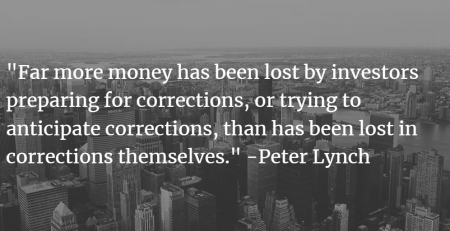Market Update: Silicon Valley Bank Crisis and Charles Schwab
I am sure you have seen the news regarding the failure of Silicon Valley Bank (SVB). SVB has been the victim of an old-fashioned bank run (driven in part by the impact of rapidly rising interest rates, and in part by a non-sticky deposit base tied to the Silicon Valley boom and bust cycle). The story is fast-moving, but the latest news is that depositors have been made whole by an emergency Fed program that is in effect providing protection above the normal $250k threshold that FDIC would cover.
For those interested in the nuts and bolts of how this situation occurred, a good summary is available here: https://www.netinterest.co/p/the-demise-of-silicon-valley-bank
Perhaps more important are the broader implications for both the market and your portfolio. Bank failures can have significant knock-on impacts if they are not dealt with swiftly – no bank holds sufficient deposits to satisfy all customer deposit withdrawals at once with little notice, and as such all banks are vulnerable to the risk of a bank run. It is only confidence in the banking institutions themselves that prevents everyone from reaching for the exits at the same time. Fortunately, during the financial crisis in 2008 as well as today, the Fed has reacted swiftly to protect customers and shore up confidence.
Regarding your portfolio, it is worth remembering that we hold no direct banks. Our logic has always been that banks are subject to such heavy regulation that it’s very difficult for management to truly control capital allocation and in addition, they are beholden to significant outside forces which they can neither control nor predict (such as interest rate movements). As a result, we simply avoid them as a group. There have been times where this has been detrimental to our relative performance, but there are also times of stress such as now when this strategy proves very helpful indeed.
However, while we own no direct banks, we do own one stock that operates in a similar way to a bank and that is Charles Schwab (SCHW) which has been caught up (unfairly in our opinion) in the recent selloffs.
Note – In terms of your own assets at TD Ameritrade (which is technically now SCHW), brokerage accounts are segregated assets and as such are not available to creditors even in the case of an insolvency. In simple terms, client assets (such as your portfolios) are legally ring-fenced from overall firm assets.
Charles Schwab Stock Update
SCHW is a leading provider of securities brokerage and wealth management services to both individual and institutional investors. It helps to think of SCHW somewhat like the Costco model. Costco is a retailer that doesn’t make much money retailing, instead passing their scale economics to the customer in exchange for profitable membership fees. Similarly, Schwab is now an online brokerage that doesn’t make much money from actual trading, instead passing their scale economics to the customer in exchange for profitable net interest spreads on their customer’s cash balances.
The way this works is that SCHW sweeps the often-small cash balances from brokerage client accounts into its bank which it then invests in mostly very low-risk government-backed securities – treasuries/MBS/etc. The difference between what SCHW pays clients in interest and what they can make by investing is net interest income for SCHW.
While SCHW takes no credit risk with these investments (unlike banks that do take risk lending deposits out) these investments are still subject to interest rate risk and due to the move in rates last year, many of these government-backed securities are currently trading beneath their purchase price on a mark-to-market basis (mark to market simply means what they could get for those securities if they had to sell them today).
Assets on the balance sheets of banks are split into two sections: Available for Sale (AFS) and Held to Maturity (HTM). Available for sale assets must be marked to market, i.e., if they’re down 10% in value, the bank accounts for this loss and this impacts their capital ratio because if they sold today, they’d get 10% less cash.
Those same accounting rules do not require any short-term losses on HTM assets to be reflected in the overall equity position. The reasons for this are sound – since these government-backed securities are ultimately riskless, if you own a government bond and are going to hold it until it matures at $100, it doesn’t really matter if it trades down to $80 at any point because you’ll eventually get your $100 back at maturity. So as long as these HTM securities aren’t sold, SCHW’s regulatory capital is not affected.
As of year-end 2022, the after-tax unrealized losses on SCHW’s AFS book, including the portion that was changed to HTM, was $22.6B, which because of these accounting rules is already captured in SCHW’s year-end equity.
This brings us to today’s worries and why SCHW is being caught up with the broader bank selloff. The worry is that if for some reason SCHW was forced to liquidate their HTM securities, this would realize losses that would impair their regulatory capital, leading them to need to raise more capital to stay in the regulator’s good graces, leading to dilution at ever lower share prices. (Similar to the SVB situation).
What could make SCHW have to liquidate those HTM securities? Well with normal banks the cause would likely be a bank run (such as SVB) – but remember SCHW isn’t like other banks because SCHW is primarily a brokerage, clients go to SCHW because they want to buy bonds, equities, etc. not to store their cash. Thus, SCHW’s cash deposits are only a byproduct of their primary business, and that significantly reduces the likelihood of a traditional bank run.
But SCHW does face a different issue with their deposits, through something called “cash sorting” which is effectively when clients choose to invest their cash balances at SCHW in higher yielding securities, so SCHW can no longer invest that cash themselves. This isn’t anything new, sometimes SCHW’s clients hold more cash and sometimes they hold less. Over time, this evens out to an equilibrium level of transactional cash.
Despite this, let’s imagine a scenario where SCHW brokerage clients pull a significant portion of the cash in their brokerage accounts, meaning SCHW would have to return those cash deposits all at once (Note – as of year-end SCHW had $367B of cash deposits). What levers can SCHW pull before they need to sell their HTM securities and take a regulatory capital hit? In other words, what sources of cash do they have access to before they would need to realize losses in their securities?
- $40.2B of cash on the balance sheet.
- $21.2B of US Treasuries that are held as AFS and mature in less than 1 year so wouldn’t realize many losses.
- $68.6B of Federal Home Loan Bank (FHLB) lending facilities – the FHLB provides loan advances against collateral to help banks meet liquidity needs, the haircut on government securities is usually small given the credit risk.
- $7.8B of FED discount window capacity.
- $1.6B in lines of credit.
- $4.8B in unsecured commercial paper.
- ~$8.0B of run-rate earnings
- The new borrowing facility just announced last night which would let SCHW borrow at par against HTM securities without realizing losses.
Even ignoring that last point, SCHW has $152.2B of breathing room before they would need to begin taking a regulatory capital hit. On top of that, they are also currently holding capital in excess of regulatory needs, so there would likely be another $12.0B buffer on top as well.
At the end of the day, we believe that SCHW can comfortably manage $100B+ of deposit cash sorting on their $367B deposit base. Last year, as interest rates went from 0% to 4%+ the cash sorting impact on SCHW’s deposit base was roughly $77B. Since higher interest rates are one of the biggest reasons and drivers for cash sorting, it is reasonable to think that with interest rates only moving from 4% to maybe 5% this year, the impact we see this year on cash sorting will likely be less dramatic than what we saw last year. Management has said just as much.
In the short run, this can all lead to earnings pressure at SCHW, but we would argue it is far from the existential crisis that is currently being priced into SCHW’s share price. Going forward, the deposits that remain and new deposits that are deployed will be put to work at much higher interest rates than in the past, meaning SCHW’s earnings power will continue to grow in the long run. The worries here are another example of the market’s short-termism and lack of work on the underlying fundamentals.
Disclosures: This website is for informational purposes only and does not constitute an offer to provide advisory or other services by GCI Investors in any jurisdiction in which such offer would be unlawful under the securities laws of such jurisdiction. The information contained on this website should not be construed as financial or investment advice on any subject matter and statements contained herein are the opinions of GCI Investors and are not to be construed as guarantees, warranties or predictions of future events, portfolio allocations, portfolio results, investment returns, or other outcomes. Viewers of this website should not assume that all recommendations will be profitable, or that future investment and/or portfolio performance will be profitable or favorable. GCI Investors expressly disclaims all liability in respect to actions taken based on any or all of the information on this website.
There are links to third-party websites on the internet contained in this website. We provide these links because we believe these websites contain information that might be useful, interesting and or helpful to your professional activities. GCI Investors has no affiliation or agreement with any linked website. The fact that we provide links to these websites does not mean that we endorse the owner or operator of the respective website or any products or services offered through these sites. We cannot and do not review or endorse or approve the information in these websites, nor does GCI Investors warrant that a linked site will be free of computer viruses or other harmful code that can impact your computer or other web-access device. The linked sites are not under the control of GCI Investors, and we are not responsible for the contents of any linked site or any link contained in a linked site. By using this web site to search for or link to another site, you agree and understand that such use is at your own risk.
All references and views offered including but not exclusive to any overall market commentary, asset class, attribution, outlook, valuation, potential returns, stocks, companies, business model, quality, outlook, management, valuation, execution, potential returns, investments, investment styles, market returns, expectations, forecasts or estimates and any other area of investing are the opinion of the manager and should not be taken as facts, projections or guarantees. All such opinions are subject to change are do not constitute a recommendation or solicitation to buy or sell a particular security.






